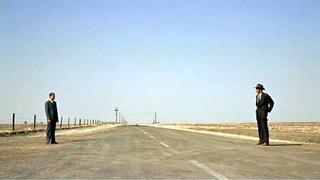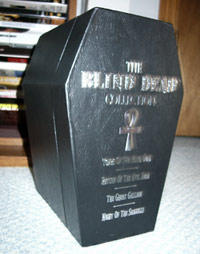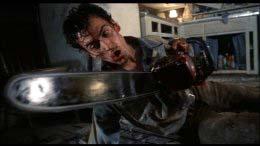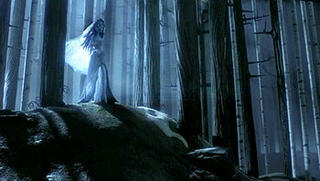 Did a speaking engagement tonight at the Denver Public Library after finding out that they might be losing funding to continue doing films in their basement what with the new budget and all meaning the fifth (or so) straight period of budget slashing at a major metropolis’ cultural center. I wonder what people are thinking about when they vote down taxes for public works – you eviscerate government, right, and government sure enough gets eviscerated. Doesn’t take a genius, but it does preclude retards. More’s the tragedy as the librarians that I’ve met at the DPL are, to a one, bright, funny, and most important, devoted to their jobs as archivists and curators – just putting together a series of road trip films that includes The Gold Rush, Sullivan’s Travels, Treasure of the Sierra Madre, and North by Northwest takes imagination and follow-through. Their reward? Their lives getting fucked with on a regular basis – benefits cut, retirement cut, hours cut, and programs like this cut. Public outreach is superfluous – the reason that the outer extremities are the first to contract gangrene, I suppose – but the outer extremities are the ones that keep us connected to the ground and reaching for the stars. Not to quote Kasey Kasem but, there you have it.
Did a speaking engagement tonight at the Denver Public Library after finding out that they might be losing funding to continue doing films in their basement what with the new budget and all meaning the fifth (or so) straight period of budget slashing at a major metropolis’ cultural center. I wonder what people are thinking about when they vote down taxes for public works – you eviscerate government, right, and government sure enough gets eviscerated. Doesn’t take a genius, but it does preclude retards. More’s the tragedy as the librarians that I’ve met at the DPL are, to a one, bright, funny, and most important, devoted to their jobs as archivists and curators – just putting together a series of road trip films that includes The Gold Rush, Sullivan’s Travels, Treasure of the Sierra Madre, and North by Northwest takes imagination and follow-through. Their reward? Their lives getting fucked with on a regular basis – benefits cut, retirement cut, hours cut, and programs like this cut. Public outreach is superfluous – the reason that the outer extremities are the first to contract gangrene, I suppose – but the outer extremities are the ones that keep us connected to the ground and reaching for the stars. Not to quote Kasey Kasem but, there you have it.
Anyway, talked before and after Treasure of the Sierra Madre tonight: to paraphrase Chris, one of the dying breed at the DPL, Bogie, you was never uglier. It’s a brilliant film, a brilliant transfer, a fine evening and one of the last for a while (after next week’s North by Northwest) here in downtown. We like to brag that Denver is turning a corner from cow-town to Metropol, but shit like this is just really shaming. It’s not like different leadership and leadership philosophies can’t resuscitate this institution – but it will do so at the expense of all the folks that this current leadership is using as grist for their great social experiment. I realize that the bootstraps, govern thyself philosophy means that with my $100.00 rebate check, I can purchase three books and get a head-start on my own little library at home but it, somehow, just isn’t quite the same thing. Rumor is that there’s not even any money for our library to buy new books.

Caught a screening on Monday of Neil Gaiman and Dave McKean’s endlessly disappointing Mirrormask - if you’re a fan (and I am) of these guys, there are hints here and there of their brilliance – but mostly, it’s just the most puerile, obvious elements of their stuff distilled into a CGI fireworks display that is, actually, just ugly. A lightshow of a different kind, watched Into the Blue this morning after learning that a screening of the Keira Knightly Pride & Prejudice set for Wednesday afternoon had been pushed back. Looking forward to that one, even though it’s longer than most movies ought to be. Mirrormask and Into the Blue both industry, press-only screenings though the former had been filled with a cinematography class from a local arts school. Kids were well-behaved though and, judging from the murmur afterwards, uniformly impressed – at least by the software. Chances are good that they would have been just as impressed by Into the Blue’s “software” as I declare I’ve just spent (another) 110 minutes with my face pressed up against Jessica Alba’s ass. Into the Blue, by the way, is sort of a remake of The Treasure of the Sierra Madre - take that as you will.
You can kind of see why they made Mirrormask for all its adolescent earnestness, but it’s hard to put a finger on why something like Into the Blue exists. It raises the daunting question of whether art has to serve a purpose – for my money, art – good art – should at least strive towards touching the face of god. The sublime as the ideal, that tingle you get when you get something that you know you can’t explain and, if you’re surrounded by the right folks, know that you won’t need to. The first time I heard Ian McShane utter “cocksucker” – I got it. The first time I saw Johnny Depp step into the town of Machine in Dead Man, I got it – hell, the first time Michael J. Fox’s DeLorean gets struck by lightning, I got it. Not to say that Into the Blue doesn’t instantly go into my memory banks as one of the most galling pictures to wiggle down the pike, just to say that I wish at those moments that I was actually in a public screening with my seat turned towards the audience.
It’s better, after all, to keep people like that in front of you.
 On a side note, finished a 4000 word-plus piece on the first season of “Lost” tonight – don’t know where it fits on the publication schedule, but at least I’m done with it barring major (and likely) rewrites. One of those episode-by-episode things you might recall if you’re a total bleeding masochist from such gems as my “Xena” and “Dark Angel” pieces (speaking of Ms. Alba). What irks me the most about Alba, I think, isn’t that she’s a bimbo, but that she has these pretensions. She refuses to strip (though, watching Into the Blue after Sin City - what’s the difference anymore?) and proclaims to the heavens that she’s cast in her insipid roles because of her non-boob-and-flat-tummy-related talents. Latest thing is her wanting to start a line of non-violent video games so that filmmakers can see what kind of action movies she’d like to make in the future – films with, I guess, more of the extreme jet skiing and less of the ugly violence of Into the Blue. Talking? Meet “out of both sides of your cute little bow of a robotic little mouth.” I hope they had professional advice before deciding to put Alba and Paul Walker in the same room together – what’s that stuff about anti-matter colliding with anti-matter that I slept through in college?
On a side note, finished a 4000 word-plus piece on the first season of “Lost” tonight – don’t know where it fits on the publication schedule, but at least I’m done with it barring major (and likely) rewrites. One of those episode-by-episode things you might recall if you’re a total bleeding masochist from such gems as my “Xena” and “Dark Angel” pieces (speaking of Ms. Alba). What irks me the most about Alba, I think, isn’t that she’s a bimbo, but that she has these pretensions. She refuses to strip (though, watching Into the Blue after Sin City - what’s the difference anymore?) and proclaims to the heavens that she’s cast in her insipid roles because of her non-boob-and-flat-tummy-related talents. Latest thing is her wanting to start a line of non-violent video games so that filmmakers can see what kind of action movies she’d like to make in the future – films with, I guess, more of the extreme jet skiing and less of the ugly violence of Into the Blue. Talking? Meet “out of both sides of your cute little bow of a robotic little mouth.” I hope they had professional advice before deciding to put Alba and Paul Walker in the same room together – what’s that stuff about anti-matter colliding with anti-matter that I slept through in college?
Pictured here, of course, is the lovely Evangeline Lilly from "Lost" demonstrating one of her two expressions. This one, which I call "expression 1" is meant to convey fatigue, concern, curiosity, chagrin, shame, resolve, uncertainty, ardor, confusion, mild irritation, major irritation, mild fear, physical discomfort, quiet bemusement, condescension, concentration, meaningful flirtation and, if held for three seconds or more, to indicate the onset of a flashback to her uninteresting backstory. That, plus a hardbody and the same Alba-like resolve not to get naked on network television but to dress in wet t-shirts and teeny-bikinis, equals fanboy pin-up infamy. Now, let's talk about why the rest of "Lost" - with maybe three exceptions - just flat stinks or, more sensibly, just wait until the review goes live and we'll use that as a springboard. Did I say "4,000-plus?" I meant "4,100-plus".









 A fairly light week for screenings and so: a chance to dive into the DVD queue. Coolest new title? The new Book of the Dead edition for
A fairly light week for screenings and so: a chance to dive into the DVD queue. Coolest new title? The new Book of the Dead edition for 



